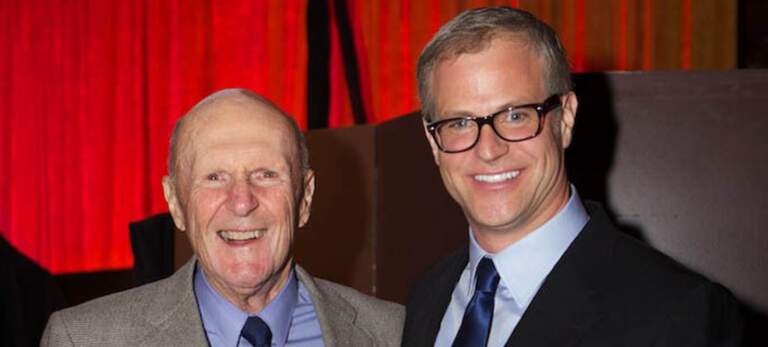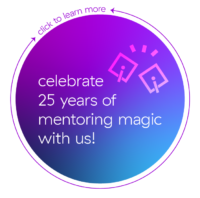Before John Griffin founded Blue Ridge Capital, he learned about investment from his mentor, Julian Robertson, the founder of Tiger Management and a hedge fund pioneer. The relationship was transformational for Griffin and inspired him to create iMentor.
Griffin recently sat down with Wells Fargo executive Tim O’Hara to discuss how mentoring is not only a crucial part of a student’s development, but also a rewarding and beneficial experience for the mentor—an opportunity to be exposed to new perspectives and to gain leadership skills that will be valuable at the workplace. He explains why young professionals should mentor a young person.
1. Because you’ll change and grow by being a mentor.
Mentoring a young person will make you a better, more empathetic leader. You’ll think more deeply about your own experiences and beliefs as well as the experiences of others, and expand your understanding of the world around you.
“When you work at a big institution like a Wells Fargo or Morgan Stanley, there's almost countless seminars on racial inequality, discrimination, unconscious bias, all these important issues,” said Griffin. “Let me tell you, when you have a mentee, and you see it through the eyes of the mentee who you're communicating with on a very consistent basis, it makes a much bigger impact on how you see the world. That’s the part I'm most proud of.”
2. Because you’ll make a big difference in the important moments.
John’s own relationship with his mentor Julian Robertson was one of the big inspirations for iMentor. He used his own experience to build the organization and craft a program that would help mentors and mentees to successfully build connections. He knows that for many of iMentor’s mentees, their mentor may be the first person they go to for advice or for help dealing with adversity.
“I can't tell you how many stories there are where the mentor has texted the mentee, ‘Stop. Call me now’” during a crisis, says Griffin. He then goes on to explain how his mentor helped him through tough times. “We all go through these crises of confidence. When I was thinking about my mentors, one great thing about Julian is he believed in me, and that's a large part of what a mentor does –they believe in you.”
3. Because students with mentors are twice as likely to graduate college.
Colleges recognize the value of mentoring and are beginning to invest in mentoring programs like iMentor. Griffin pointed to Lehman College, which, along with Hunter College, another school in the City University of New York system, partnered with iMentor to provide extra support to iMentor students enrolled at Lehman and Hunter.
The Alice Griffin CUNY Scholars Program for iMentor students offers financial scholarships, comprehensive college advising, financial aid workshops, and internship support, as well as organizing activities for scholars and mentors.
Mentors provide guidance and support throughout the college experience, helping students to navigate challenges and obstacles. This can include providing advice on course selection, helping students to develop study skills and time management strategies, and offering encouragement and motivation to stay on track. As a result, the graduation rate for iMentor students is nearly twice that of peers without mentors.
4. Because mentoring is easy to schedule around your work and life, thanks to the mix of virtual and in-person mentoring.
When Griffin cofounded iMentor in 1999, he drew inspiration when he was in his office at Blue Ridge Capital, looking across to the South Bronx, and realized that the new “email age” would be a great time to jumpstart a mentoring program.
“iMentor started with the technology, the email and the prompt and the internet and the asynchronous,” he explains. “This was a breakthrough--we made it asynchronous. So, the impact you'll be having on your mentee will be on your time. You might be in an Uber filling out a prompt on why you applied to the college you did, why you chose the career you chose, who has been a mentor in your life, what's an influential book, all organized by iMentor, all on your ride home, after work, on your weekend.”
With in-person activities with your mentee once a month, it’s easy to mentor while staying focused on your job and life. Mentors and mentees will often text and some also meet up outside of designated pair events.
5. Because you’ll be able to build a personal connection with your mentee.
John and his first mentee slowly got to know each other and eventually discovered a shared interest in accounting and numbers, which they were able to build upon. Through their relationship, John was able to help his mentee get a master's degree in accounting and even hired him at his own company.
“Sometimes the mentor relationship starts off strong and other times it takes time to grow,” said John. “But if it wasn't hard, it wouldn't be worthwhile.”
iMentor matches mentees and mentors based on common interests and backgrounds. The iMentor curriculum provides a weekly prompt that serves as a natural and guided way for mentors and mentees to build their relationship over time.
6. Because you’ll have plenty of support—you won’t be mentoring alone.
When John created iMentor, he knew that it was critical for iMentor to support mentors so they can help guide mentees through high school and beyond.
iMentor program managers, who work directly with iMentor students, provide support to the mentors. As John explains, they are there to help foster the mentor-mentee relationship, which is the core of the mentoring experience.
Program managers also provide a research-based curriculum for the pairs to follow. They are able to answer questions the mentor may have and help mentees and mentors through any challenges.
Sign up to receive more information about becoming a mentor. See how NY Giants legend Justin Tuck inspires people to mentor with iMentor. Watch how one mentor inspired his mentee to follow his dream of becoming an entrepreneur.

